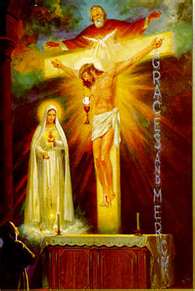A poor paralytic is presented to Our Lord; he probably had himself brought there to ask for bodily health, but in the presence of Jesus, he realizes that he is a sinner and remains confused and humiliated before Our Lord. Jesus had already read his heart, and seeing his faith and humility, He does not even wait for him to speak, but suddenly says to him with infinite kindness: Be of good heart, son, thy sins are forgiven thee (today’s Holy Gospel, Mt. 9.1-8). The first and the greatest miracle has taken place: the man is no longer a slave of Satan; he is now a child of God. Jesus, Who came to save souls, rightfully healed the soul before the body. For this purpose, the Son of God appeared that He might destroy the works of the devil (1 Jn. 3.8).
This miracle, however, does not please the Scribes who, not believing in the divinity of Jesus, begin immediately in the secret of their hearts to accuse Him of blasphemy (for who could forgive sins but God alone!). But the Master, Who had read the soul of the paralytic, also reads theirs. Why do you think evil in your hearts? If Jesus had seen there even a little humility and faith, He would have been as ready to heal them as He was to heal the heart of the paralytic; but unfortunately, He found nothing but pride and obstinacy. However, He wishes to use every means to soften them, so He gives them the strongest proof of His divinity. But that you may know that the Son of man hath power on earth to forgive sins, then he said to the man sick of the palsy, Arise, take up thy bed, and go into thy house. And he arose and went into his house. The word of Jesus effected immediately what it expressed. The words of God alone could have such power. But the Scribes will not admit that they are defeated: when the heart is proud and obstinate, not even factual evidence is capable of moving it.
Let us never say our faith is weak because we do not see or touch with our hand the truth which is proposed for our belief; let us rather admit that it is weak because our heart is not sufficiently docile to grace, nor entirely free from pride. If we want to have strong faith, let us be as humble and simple as children; if we wish to share in the grace of sanctification which was given to the paralytic, let us offer ourselves to Our Lord with contrite, humble hearts, thoroughly convinced that we need His help and forgiveness.


No comments:
Post a Comment